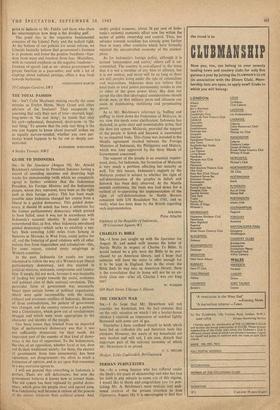SIR,—In the Spectator (August 30), Mr. Arnold I3eichman's reference to
President Sukarno having a record of unending successes and deserving high marks for statesmanship (with which we completely agree) is further evidence that the Indonesian President, his Foreign Minister and the Indonesian people, whom they represent, have been on the right path in their foreign policy. This has been made possible since Indonesia changed her course from a liberal to a guided democracy. This guided demo- cracy, it should be noted, has been a substitute for the former parliamentary democracy which proved to have failed, since it was not in accordance with Indonesia's national identity. It should also be remembered that, at first, when Indonesia introduced guided democracy—which seeks to establish a uni- tary State covering 3,000 miles from Sabang in Sumatra to Mcrauke in West Irian, social justice for all, and the fostering of good relations with all other nations free from imperialism and colonialism—this, for some reason, created many misgivings in Western countries.
In the past, Indonesia for nearly ten years attempted to follow the way of a Western-type liberal parliamentary democracy, and this resulted in political tensions, stalemate, compromise and frustra- tion. It simply did not work, because it was incapable of leading her people towards the social, economic and political aims of their national revolution. This particular form of government was necessarily based upon certain forms of political organisation which were quite incompatible with the social, cultural and economic realities of Indonesia. Because of these contradictions, the pattern of government was changed, and the country returned to a pattern, and a Constitution, which grew out of revolutionary struggle and which were more appropriate to the character and identity of the people.
One basic lesson they learned from an imported type of parliamentary democracy was that it was not sufficiently democratic for their needs. An important part of the essence of that kind of demo- cracy is the fact of opposition. To the Indonesians, the idea of an opposition, whether loyal or not, does not fit their traditional society; for them, the essence of govehment, from time immemorial, has been agreement, not disagreement—the effort to reach a consensus of opinion, and to act upon that consensus in a way everyone agrees to.
I will not pretend that everything in Indonesia is perfect. There are still deficiencies, but now the government believes it knows how to correct them. The old system has been replaced by guided demo- cracy, which gives the people clear and agreed aims, It is functioning well because it utilises all the powers of the nation, whatever their political colour. And,
under guided economy, about 70 per cent of Indo- nesia's national economic effort now lies within the sector of public ownership and control. Thus, her advance towards socialism has already gone further than in many other countries which have formally rejected the uncontrolled economy of the market- place.
As for Indonesia's foreign policy, although it is termed 'independent and active,' others call it un- committed. The country is non-aligned in the sense that it is not a member of any bloc or alliance, but it is not neutral, and never will be so long as there are still peoples living under the rule of colonialism and imperialism. Indonesia does not believe that total truth or total justice permanently resides in one or other of the great power blocs. She does not accept the idea that ideological considerations should divide men, or that military pacts and alliances can assist in maintaining, stabilising and perpetuating peace.
As to Mr. Beichman's reference to 'huffing and puffing' to blow down the Federation of Malaysia, in my view this needs some clarification. Indonesia has declared, in quite clear and unmistakable terms, that she does not oppose Malaysia, provided the support of the people in Sabah and Sarawak is ascertained by an impartial body. This clause was included in the Manila agreement reached between the Foreign Ministers of Indonesia, the Philippines and Malaya, which was later approved by the three Heads of Government concerned.
The support of the people is an essential require- ment, since, for Indonesia, the formation of Malaysia is very much a problem affecting her security as well. For this reason, Indonesia's support to the Malaysia project is subject to whether the right of self-determination of the peoples in Sabah and Sarawak has been duly observed. At the Manila summit conference, the basis was laid down for a method of re-appraising the implementation of the right of self-determination in North Borneo consistent with UN Resolution No. 1541, and to verify what has been done by the British regarding such implementation.
SUKARNO
Press Attache Embassy of the Republic of Indonesia, 38 Grosvenor Square, WI






































 Previous page
Previous page